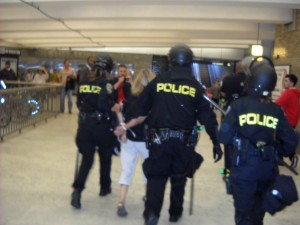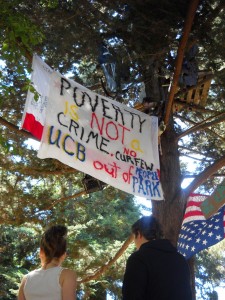
File photo of August arrests in San Francisco.

New protesters call attention to old issues at People’s Park in Berkeley CA.
As the ninth month of the year begins, here are a few items that the columnist considers important cultural tidbits: an unpopular Democratic President is struggling to get renominated, a bumper sticker being sold on Telegraph Avenue in Berkeley asks: “Hey, hey, LBJ, how many kids did you kill today?,” there is an ongoing protest at People’s Park, the Freedom of Speech issue is spawning arrests, a new book by Shel Silverstein is due out this month, the Playboy Club (and “the bunny slouch”?) will be featured in a new TV series, and Pan Am will get tons of free publicity from a new fall TV series (perhaps based on the book “Coffee, Tea, or me?”?), so with out looking at a calendar can you please say what year is this? British disk jockey Danny Baker recently proclaimed that this year is 1968 and he might be right.
The longer Obama is President the easier it becomes for a pundit to make clever and perceptive comments; all that’s needed is a great memory. A case in point would be pollution and global warming. You don’t need to be a conspiracy theory scientist to have a major emotional reaction to a bit of popular American culture from 1970. Who can watch the Iron Eyes Cody Public Service Announcement and not get the point?
Who can listen to “Man in Black,” Johnny Cash’s 1971 hit that covered just about all of today’s problems, and not find it moving?
For people living in Berkeley and facing the task of preparing to mark the fiftieth anniversary of Mario Savio’s speech from the top of a police car, the recent No Justice No BART protests and arrests about the Freedom of Speech issue has a distinct “been there done that” aspect.
People’s Park is back in the news. Activists are staging a protest. They assert that the University of California in Berkeley is using incremental limitations as a way of trying to end the use of the area known as People’s Park as a campsite for homeless people. Activists inform journalists that efforts are being made to end the program to feed the homeless in the park. Similar protests in 1969 were suspended after the Park and the protests, which resulted in the death of James Richter, became national news stories.
Peace is still the objective for Peaceniks only the name of the war has changed.
Mario Savio objected to high tuition fees in the Sixties and asserted that students had a right to express their opinions. Two years ago students were holding demonstrations at UCB to draw attention to increases in tuition costs.
Over the Labor Day weekend, a march by the United Farm Workers reached Sacramento where they hoped to deliver their list of grievances and goals to the governor of California.
For a columnist who made futile efforts to get to the 1968 Democratic National Convention in Chicago, this year’s issues and protests have a strong déjà vu aspect to them. One ingredient that is missing from attempts to photograph and write about this year’s events is an endless supply of energy and enthusiasm.
Scrambling around the San Francisco Bay area to get photos at a benefit for the Northern California 9/11 Truth Alliance, People’s Park and the various No Justice No BART protests, it is obvious that getting a by-line in the Berkeley Barb is a goal that will never be accomplished.
In one day, can one reporter photographer cover a nine hour event at the Grand Lake Theater in Oakland, a planned new No Justice No BART event in San Francisco, and check in with the protest in People’s Park? Obviously we’ll have to postpone plans to do a round-up column on the current spate of items concerned with the quality of the judicial branch of government in the USA today. We’re working on developing other columns such as one that compares the Republican philosophy to that of the Apaches and play with the irony that some famous Republicans have been accused of kidnapping Geronimo’s skull.
We’ll try to cover the Sunday event at the Herbst Theater in San Francisco on September 11. We’ll monitor the People’s Park protest. We’ll do updates on the No Justice No BART protests. Rather than struggling with the knack of loading Tri-X film on the Nikkor reels, we’ll be struggling to learn the new html skills to move our photojournalism into the digital era, but we will also be aware of certain other limitations on our efforts.
Back in 1968, the World’s Laziest Journalist used to annoy the snot out of some close friends by introducing cultural comments and insights with the phrase “Back in 1968.” We don’t bug them with that shtick anymore because a two of the folks who were most upset with it, have “gone to the happy hunting grounds.”
In the April 1965 issue of Cavalier magazine, Paul Krassner wrote: “There was, of course, one Berkeley administration official who mustered up his oversimplification gland and labeled the protest there as not much more than a ‘civil rights panty raid.’”
Krassner also wrote: “There is an Establishment (translate: in-power) point of view about events such as these – usually predictable but nevertheless in a state of limited flux – and the mass media serve as vehicles for and reflections of the Establishment point of view.” What if Rupert Murdoch is the Establishment?
Now the disk jockey will give some Berkeley musicians a bit of exposure by playing the “Fixing to Die” rag, “Run through the Jungle,” and “Long as I can see the Light.” We have to go and try to buy a copy of Eye magazine. Have a “hella-groovy” type week.
Is 1968 really over?
File photo of August arrests in San Francisco.
New protesters call attention to old issues at People’s Park in Berkeley CA.
As the ninth month of the year begins, here are a few items that the columnist considers important cultural tidbits: an unpopular Democratic President is struggling to get renominated, a bumper sticker being sold on Telegraph Avenue in Berkeley asks: “Hey, hey, LBJ, how many kids did you kill today?,” there is an ongoing protest at People’s Park, the Freedom of Speech issue is spawning arrests, a new book by Shel Silverstein is due out this month, the Playboy Club (and “the bunny slouch”?) will be featured in a new TV series, and Pan Am will get tons of free publicity from a new fall TV series (perhaps based on the book “Coffee, Tea, or me?”?), so with out looking at a calendar can you please say what year is this? British disk jockey Danny Baker recently proclaimed that this year is 1968 and he might be right.
The longer Obama is President the easier it becomes for a pundit to make clever and perceptive comments; all that’s needed is a great memory. A case in point would be pollution and global warming. You don’t need to be a conspiracy theory scientist to have a major emotional reaction to a bit of popular American culture from 1970. Who can watch the Iron Eyes Cody Public Service Announcement and not get the point?
Who can listen to “Man in Black,” Johnny Cash’s 1971 hit that covered just about all of today’s problems, and not find it moving?
For people living in Berkeley and facing the task of preparing to mark the fiftieth anniversary of Mario Savio’s speech from the top of a police car, the recent No Justice No BART protests and arrests about the Freedom of Speech issue has a distinct “been there done that” aspect.
People’s Park is back in the news. Activists are staging a protest. They assert that the University of California in Berkeley is using incremental limitations as a way of trying to end the use of the area known as People’s Park as a campsite for homeless people. Activists inform journalists that efforts are being made to end the program to feed the homeless in the park. Similar protests in 1969 were suspended after the Park and the protests, which resulted in the death of James Richter, became national news stories.
Peace is still the objective for Peaceniks only the name of the war has changed.
Mario Savio objected to high tuition fees in the Sixties and asserted that students had a right to express their opinions. Two years ago students were holding demonstrations at UCB to draw attention to increases in tuition costs.
Over the Labor Day weekend, a march by the United Farm Workers reached Sacramento where they hoped to deliver their list of grievances and goals to the governor of California.
For a columnist who made futile efforts to get to the 1968 Democratic National Convention in Chicago, this year’s issues and protests have a strong déjà vu aspect to them. One ingredient that is missing from attempts to photograph and write about this year’s events is an endless supply of energy and enthusiasm.
Scrambling around the San Francisco Bay area to get photos at a benefit for the Northern California 9/11 Truth Alliance, People’s Park and the various No Justice No BART protests, it is obvious that getting a by-line in the Berkeley Barb is a goal that will never be accomplished.
In one day, can one reporter photographer cover a nine hour event at the Grand Lake Theater in Oakland, a planned new No Justice No BART event in San Francisco, and check in with the protest in People’s Park? Obviously we’ll have to postpone plans to do a round-up column on the current spate of items concerned with the quality of the judicial branch of government in the USA today. We’re working on developing other columns such as one that compares the Republican philosophy to that of the Apaches and play with the irony that some famous Republicans have been accused of kidnapping Geronimo’s skull.
We’ll try to cover the Sunday event at the Herbst Theater in San Francisco on September 11. We’ll monitor the People’s Park protest. We’ll do updates on the No Justice No BART protests. Rather than struggling with the knack of loading Tri-X film on the Nikkor reels, we’ll be struggling to learn the new html skills to move our photojournalism into the digital era, but we will also be aware of certain other limitations on our efforts.
Back in 1968, the World’s Laziest Journalist used to annoy the snot out of some close friends by introducing cultural comments and insights with the phrase “Back in 1968.” We don’t bug them with that shtick anymore because a two of the folks who were most upset with it, have “gone to the happy hunting grounds.”
In the April 1965 issue of Cavalier magazine, Paul Krassner wrote: “There was, of course, one Berkeley administration official who mustered up his oversimplification gland and labeled the protest there as not much more than a ‘civil rights panty raid.’”
Krassner also wrote: “There is an Establishment (translate: in-power) point of view about events such as these – usually predictable but nevertheless in a state of limited flux – and the mass media serve as vehicles for and reflections of the Establishment point of view.” What if Rupert Murdoch is the Establishment?
Now the disk jockey will give some Berkeley musicians a bit of exposure by playing the “Fixing to Die” rag, “Run through the Jungle,” and “Long as I can see the Light.” We have to go and try to buy a copy of Eye magazine. Have a “hella-groovy” type week.